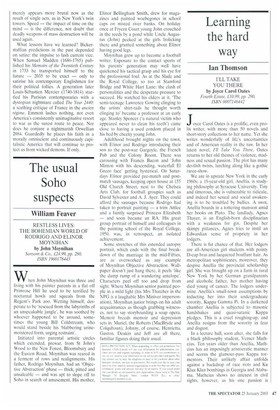Learning the hard way
Ian Thomson
I'LL TAKE YOU THERE by Joyce Carol Oates Fourth Estate, £10.99, pp. 290, ISBN 0007146442 Joyce Carol Oates is a prolific, even prolix writer, with more than 50 novels and short-story collections to her name. Yet she writes wonderfully of life's uncertainties and of American reality in the raw. In her latest novel, I'll Take You There, Oates returns to her old themes of violence, madness and sexual passion. The plot has many devilish twists, lurching along like a gothic raree-show.
We are in upstate New York in the early 1960s; a 19-year-old girl, Anellia, is studying philosophy at Syracuse University. Tiny and timorous, she is vulnerable to ridicule, and indeed her sexual and social awakening is to be troubled by bullies. A swot, Anellia boards in a tottering mansion amid her books on Plato. The landlady, Agnes Thayer, is an English-born disciplinarian with a weakness for gin. Despite her skimpy pittances, Agnes tries to instil an Edwardian sense of propriety in her lodgers.
There is fat chance of that. Her lodgers are all-American girl students with pointy D-cup bras and lacquered bouffant hair. As metropolitan sophisticates, moreover, they despise Anellia the provincial scholarship girl. She was brought up on a farm in rural New York by her German grandparents and alcoholic father, her mother having died young of cancer. The lodgers undermine Anellia's small-town assumptions by inducting her into their undergraduate sorority, Kappa Gamma Pi. In a darkened chamber Anellia is subjected to masonic handshakes and quasi-satanic Kappa pledges, This is a cruel roughing-up, and Anellia resigns from the sorority in fear and disgust.
In a lecture hall, soon after, she falls for a black philosophy student, Verner Matheius. Ten years older than Anellia, Matheius has an imposingly aristocratic manner and scorns the glamour-puss Kappa tormentors. Their unlikely affair unfolds against a backdrop of race riots and Ku Klux Klan bombings in Georgia and Alabama. Matheius shows no interest in civil rights, however, as his one passion is Wittgenstein. Anellia is not impressed by his political indifference and is furthermore appalled to discover that he is married with children. The betrayal has scarcely sunk in when Anellia is informed that her father is dying. She races to Colorado to see him one last time. By now she has become a writer. Her short stories (like those of Joyce Carol Oates) betray the gothic influence of William Faulkner, but will her father live to see them? A significant realignment is underway as Anellia contemplates a world without a father.
Much of this novel seems to be autobiographical. Joyce Carol Oates, like her 'sloeeyed' heroine Anellia, went to Syracuse University. Again like Anellia, she grew up on a farm in western New York State. Perhaps, by transposing her student days into fiction, Oates hopes to give them literary meaning and justification? The writing is occasionally pretentious (panels in the world's opacity slide open unexpectedly') and allusions to Spinoza and Wittgenstein clutter the narrative. For me, the novel sagged half-way when we left the nasty sorority girls and moved on to the less interesting Matheius. Nevertheless, I'll Take You There is often absorbing, and lingers in the mind. Presumably the title is taken from the Staple Singers' 1972 smash hit, 'I'll Take You There'.
Ian Thomson 's biography of Primo Levi is published by Hutchinson.



















































































 Previous page
Previous page